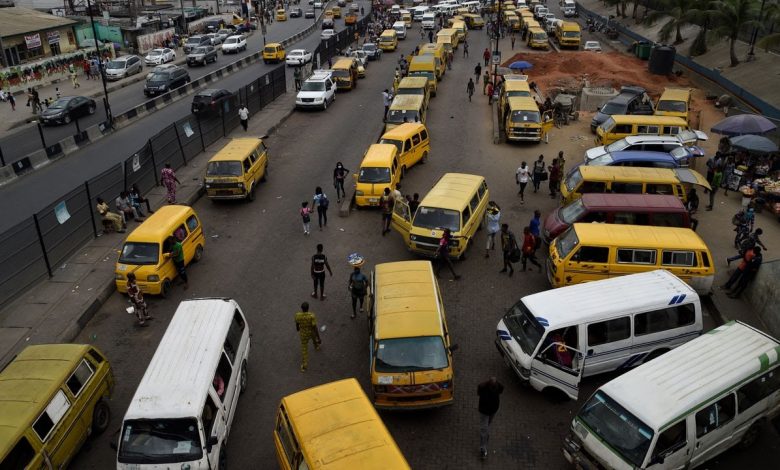Non-Essential Workers in Nigeria Still Travelling Inter-State Despite Ban

As part of its national response to the COVID-19 pandemic, Nigeria officially placed a ban on non-essential inter-state travelling connected to Lagos, Ogun, and Abuja in March. A month later, President Muhammadu Buhari extended this restriction across the country.
In practice, however, Nigerians who are not providing essential services are still able to move freely from one state to another, oftentimes with the connivance of security agents. Experts believe this trend draws back progress made in the fight against the viral infection.
According to the Nigeria Centre for Disease Control (NCDC), social distancing, which is often disregarded during public transportation, is “an effective way to limit the chances of catching the virus, slowing down the transmission and reducing the spread of COVID-19 in Nigeria”.
Kehinde Muraina, a Medical Laboratory Scientist, who recently travelled from Oyo to Lagos described the situation as chaotic.
“When we got to the Lagos-Ibadan expressway, we were stuck and told not to move. I had to show the security agents documents identifying me as a medical practitioner. They checked the number of people in the vehicles and confirmed if they were essential service providers,” he said.
He added that no social distancing took place on the road because “everyone asked to park came down to plead with the policemen and army officers”. “The situation was very. People were sweating, coughing, constantly talking, moving close to and touching each other so they could be allowed to travel,” he recalled.
Asides the poor hygiene observed, the highways have also created opportunities for extortion as law enforcement agents unlawfully give passage to vehicles containing non-essential workers.
A resident of Abuja, who travelled to Ibadan, Oyo State, for a wedding right before the lockdown, and returned to the Federal Capital Territory on May 2 despite the ban, shared his experience with HumAngle. At the park that morning, there were three minibuses waiting for passengers and the drivers informed him one had moved already.
Each bus was filled with 18 passengers, with four on each seat. Each person was charged N6,550 as against the pre-lockdown fare of N4,500, and the reason soon became obvious. The bus took off at Iwo Road, went to Oyo town, proceeded to Ilorin, and then Jebba before entering Abuja through Minna, Niger State.
“From Ibadan to Ogbomosho to Kwara, no policemen disturbed us. They were not on the road at all,” he said.
“But between Jebba and Abuja, the driver started bribing policemen with N1,000 at each checkpoint. What he spent in total could not have been more than N5,000 or N6,000.”
He added that before the bus got to Niger, officials of the Nigeria Immigration Service flagged down the bus and gave people without identification cards two options: detention or bribe ranging from N500 to N1000.
HumAngle revealed in April how security operatives extorted motorists at various places including the boundary between Anambra and Enugu. Similar reports have been made about the Edo-Delta, Oyo-Osun, Ogun-Lagos, Enugu-Imo borders, as well as states such as Abia, and Kaduna.
Many fear that illegal travelling between states will lead to an increase in the community transmission of the virus. And there is evidence of this happening already. Commissioner for Health in the Osun state, Dr Rafiu Isamotu, confirmed on Saturday that one person who tested positive for COVID-19 had “sneaked into the State from Kano”.
The Kaduna State government recently blamed inter-state travelling for the spread of the virus to various local governments. Special Adviser to the Governor on Media and Communication, Muyiwa Adekeye, said violation of the quarantine order and “the misconduct of some law enforcement officers that have facilitated and indulged this grossly irresponsible pattern of interstate travel” are jeopardising the sacrifices made by the people.
The situation is further complicated by steps taken by various state governments in the north to relocate hundreds of nomadic children (almajiri) to their states of origin.
On Friday, May 8, 189 violators of the ban were arrested after entering Abuja through trucks. At the Gakem-Benue border in Cross River, security operatives sent back a set of trucks carrying over 30 almajiri children. In Kwara, a similar incident involved an estimated 200 almajiri conveyed in a truck intercepted at the Kanbi/Oloru axis.
Also, earlier in the month, 11 travellers from Sokoto were arrested by the police at the Asejire border post between Oyo and Osun State.
“We are not able to explain how they got here in the first place because there is inter-state lockdown throughout the country. They claimed they came from Sokoto and they must have passed through so many states,” the Oyo State governor, Engr. Seyi Makinde, observed.
Director-General of the World Health Organization, Tedros Adhanom, said in April that the way many countries have suppressed transmission is through stay-at-home orders and other physical distancing measures.
He warned against complacency, which he described as “one of the greatest dangers we face now”.
“People understandably want to get on with their lives, because their lives and livelihoods are at stake. That’s what WHO wants too. And that’s what we are working for, all day, every day. But the world will not and cannot go back to the way things were,” he warned.
Support Our Journalism
There are millions of ordinary people affected by conflict in Africa whose stories are missing in the mainstream media. HumAngle is determined to tell those challenging and under-reported stories, hoping that the people impacted by these conflicts will find the safety and security they deserve.
To ensure that we continue to provide public service coverage, we have a small favour to ask you. We want you to be part of our journalistic endeavour by contributing a token to us.
Your donation will further promote a robust, free, and independent media.
Donate HereStay Closer To The Stories That Matter




